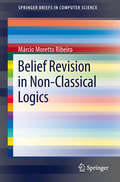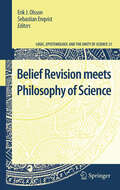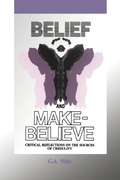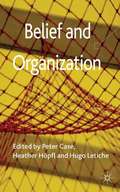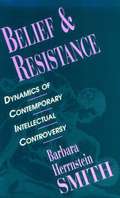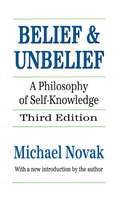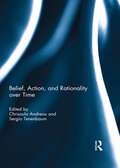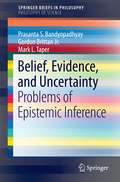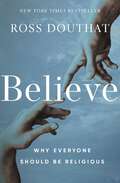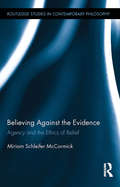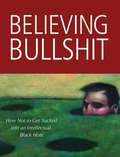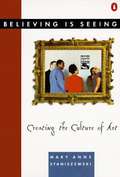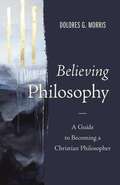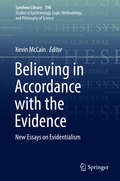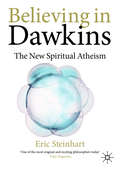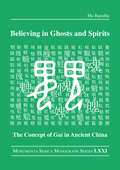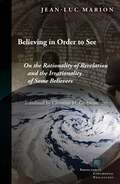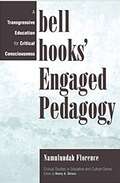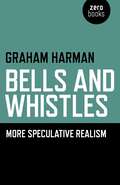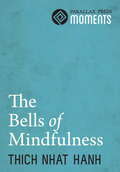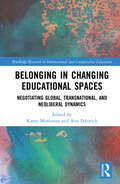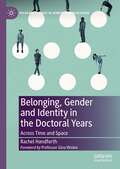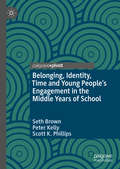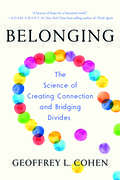- Table View
- List View
Belief Revision in Non-Classical Logics (SpringerBriefs in Computer Science)
by Márcio Moretto RibeiroSince the advent of the Semantic Web, interest in the dynamics of ontologies (ontology evolution) has grown significantly. Belief revision presents a good theoretical framework for dealing with this problem; however, classical belief revision is not well suited for logics such as Description Logics. Belief Revision in Non-Classical Logics presents a framework which can be applied to a wide class of logics that include - besides most Description Logics such as the ones behind OWL - Horn Logic and Intuitionistic logic, amongst others. The author also presents algorithms for the most important constructions in belief bases. Researchers and practitioners in theoretical computing will find this an invaluable resource.
Belief Revision meets Philosophy of Science (Logic, Epistemology, and the Unity of Science #21)
by Sebastian Enqvist Erik J OlssonBelief revision theory and philosophy of science both aspire to shed light on the dynamics of knowledge - on how our view of the world changes (typically) in the light of new evidence. Yet these two areas of research have long seemed strangely detached from each other, as witnessed by the small number of cross-references and researchers working in both domains. One may speculate as to what has brought about this surprising, and perhaps unfortunate, state of affairs. One factor may be that while belief revision theory has traditionally been pursued in a bottom- up manner, focusing on the endeavors of single inquirers, philosophers of science, inspired by logical empiricism, have tended to be more interested in science as a multi-agent or agent-independent phenomenon.
Belief and Make-Believe
by George Albert WellsWhy do so many people - sometimes even intelligent people - swallow the preposterous claims of religion? G.A. Wells, the leading freethinker of our time, tries to shed light on this puzzle in his entertaining and enormously learned book, Belief and Make-Believe.Professor Wells begins by analyzing the nature of belief. To dispel popular confusions on the relation between words and thoughts, he compares the thinking process of scientists, laymen, and chimpanzees.The power of emotion and instinct to help form people's ideological outlooks is analyzed by preference to "defiance" and "reliance", polar attitudes which arise from the need for dominance and submission in primate groups. Wells shows the influence of defiance and reliance in patriotism and in monotheistic religions, where submission to the will of the omnipotent is a wonderful technique for feeling secure in the face of life's actual and ineradicable dangers.Since the knowledgeable Christians now accept that the Bible is uneven, unreliable, and sometimes morally abhorrent, and that the New Testament account of the origin of Christianity is mostly legend, various attempts have been made to save something from the debris by selective re-interpretation. Wells evaluates several typical examples, showing how the apologists shrink from the clear implications of their arguments, which would demolish the whole edifice of Christian doctrine.Finally, Professor Wells debunks some of the extravagant and mystical claims that have been made for the arts, notably poetry, as quasi-religious vehicles for gaining insights into the human condition.
Belief and Organization
by Peter Case Hugo Letiche Heather HöpflExamines the alternative belief systems which contemporary organizational actors live by and through which they seek to find meaning within the dominant (neo)capitalist social order. This volume marks an attempt to move the study of belief forward within management and organization studies.
Belief and Resistance: Dynamics of Contemporary Intellectual Controversy
by Barbara H. SmithThe controversies between traditionalists and postmodernists are the topic of this book. It examines questions at the heart of the debate, such as: truth, reason, and objectivity - can we survive without them? What happens to law, science and the persuit of justice when these ideals are abandoned? The clash of belief and skepticism, and our need for intellectual stability are also examined.
Belief and Unbelief: A Philosophy of Self-knowledge
by Michael NovakThis is perhaps the most widely read of Michael Novak's books. Belief and Unbelief attempts to push intelligence and articulation as far as possible into the stuff of what so many philosophers set aside as subjectivity. It is an impassioned critique of the idea of an unbridgeable gap between the emotive and the cognitive � and in its own way, represents a major thrust at positivist analysis.Written in a context of personal tragedy as well as intellectual search, the book is grounded in the belief that human experience is enclosed within a person to person relationship with the source of all things � sometimes in darkness, other tunes in aridity, but always in deep encounter with community and courage. It is written with a deep fidelity to classical Catholic thought as well as a sense of the writings of sociology, anthropology, and political theory�from Harold Lasswell to Friedrich von Hayek.This third edition includes Novak's brilliant 1961 article "God in the Colleges" from Harper's � a critique of the technification of university life that rules issues of love, death, and personal destiny out of bounds, and hence leaves aside the mysteries of contingency and risk, in favor of the certainties of research, production, and consumption. For such a "lost generation" Belief and Unbelief will remain of tremendous interest and impact.When the book first appeared thirty years ago, it was praised by naturalists and religious thinkers alike. Sidney Hook called it "a remarkable book, written with verve and distinction." James Collins termed it "a lively and valuable essay from which a reflective, religiously concerned reader can draw immense profit." And The Washington Post reviewer claimed that "Novak has written a rich, relentlessly honest introduction to the problem of belief. It is a deeply personal book, rigorous in argument and open ended in conclusions."
Belief, Action, and Rationality over Time
by Chrisoula Andreou and Sergio TenenbaumAction theorists and formal epistemologists often pursue parallel inquiries regarding rationality, with the former focused on practical rationality, and the latter focused on theoretical rationality. In both fields, there is currently a strong interest in exploring rationality in relation to time. This exploration raises questions about the rationality of certain patterns over time. For example, it raises questions about the rational permissibility of certain patterns of intention; similarly, it raises questions about the rational permissibility of certain patterns of belief. While the action-theoretic and epistemic questions raised are closely related, advances in one field are not always processed by the other. This volume brings together contributions by scholars in action theory and formal epistemology working on questions regarding rationality and time so that researchers in these overlapping fields can profit from each other’s insights. This book was originally published as a special issue of the Canadian Journal of Philosophy.
Belief, Evidence, and Uncertainty: Problems of Epistemic Inference (SpringerBriefs in Philosophy #0)
by Prasanta S. Bandyopadhyay Gordon Brittan Jr. Mark L. TaperThis work breaks new ground by carefully distinguishing the concepts of belief, confirmation, and evidence and then integrating them into a better understanding of personal and scientific epistemologies. It outlines a probabilistic framework in which subjective features of personal knowledge and objective features of public knowledge have their true place. It also discusses the bearings of some statistical theorems on both formal and traditional epistemologies while showing how some of the existing paradoxes in both can be resolved with the help of this framework. This book has two central aims: First, to make precise a distinction between the concepts of confirmation and evidence and to argue that failure to recognize this distinction is the source of certain otherwise intractable epistemological problems. The second goal is to demonstrate to philosophers the fundamental importance of statistical and probabilistic methods, at stake in the uncertain conditions in which for the most part we lead our lives, not simply to inferential practice in science, where they are now standard, but to epistemic inference in other contexts as well. Although the argument is rigorous, it is also accessible. No technical knowledge beyond the rudiments of probability theory, arithmetic, and algebra is presupposed, otherwise unfamiliar terms are always defined and a number of concrete examples are given. At the same time, fresh analyses are offered with a discussion of statistical and epistemic reasoning by philosophers. This book will also be of interest to scientists and statisticians looking for a larger view of their own inferential techniques. The book concludes with a technical appendix which introduces an evidential approach to multi-model inference as an alternative to Bayesian model averaging.
Believe: Why Everyone Should Be Religious
by Ross DouthatAn Instant <b>New York Times Bestseller</b> "Truly a Mere Christianity for the 21st century"--World magazine <p> Do you ever wish you had more faith? Here is a blueprint for thinking your way from doubt to belief. As a columnist for the New York Times who writes often about spiritual topics for a skeptical audience, Ross Douthat understands that many of us want to have more faith than we do. Douthat argues that in light of what we know today it should be harder to not have faith than to have it. With empathy, clarity, and rigor, Douthat explores: Why nonbelief requires ignoring what our reasoning faculties tell us about the world. How modern scientific developments make a religious worldview more credible, not less. Why it's entirely reasonable to believe in mystical and supernatural realities. How an open-minded religious quest should proceed amid the diversity of religious faiths. How Douthat's own Christianity is informed by his blueprint for belief. <p> With clear and straightforward arguments, Believe shows how religious belief makes sense of the order of the cosmos and our place within it, illuminates the mystery of consciousness, and explains the persistent reality of encounters with the supernatural. Highly relevant for our current moment, Believe offers a pathway for thinking your way from doubt into belief, from uncertainty about our place in the universe into a confidence that we are here for a reason.
Believing Against the Evidence: Agency and the Ethics of Belief (Routledge Studies in Contemporary Philosophy)
by Miriam Schleifer McCormickThe question of whether it is ever permissible to believe on insufficient evidence has once again become a live question. Greater attention is now being paid to practical dimensions of belief, namely issues related to epistemic virtue, doxastic responsibility, and voluntarism. In this book, McCormick argues that the standards used to evaluate beliefs are not isolated from other evaluative domains. The ultimate criteria for assessing beliefs are the same as those for assessing action because beliefs and actions are both products of agency. Two important implications of this thesis, both of which deviate from the dominant view in contemporary philosophy, are 1) it can be permissible (and possible) to believe for non-evidential reasons, and 2) we have a robust control over many of our beliefs, a control sufficient to ground attributions of responsibility for belief.
Believing Bullshit: How Not to Get Sucked into an Intellectual Black Hole
by Stephen LawThis book identifies eight key mechanisms that can transform a set of ideas into a psychological flytrap. The author suggests that, like the black holes of outer space, from which nothing, not even light, can escape, our contemporary cultural landscape contains numerous intellectual black-holes-belief systems constructed in such a way that unwary passers-by can similarly find themselves drawn in. While such self-sealing bubbles of belief will most easily trap the gullible or poorly educated, even the most intelligent and educated of us are potentially vulnerable. Some of the world's greatest thinkers have fallen in, never to escape. This witty, insightful critique will help immunize readers against the wiles of cultists, religious and political zealots, conspiracy theorists, promoters of flaky alternative medicines, and others by clearly setting out the tricks of the trade by which such insidious belief systems are created and maintained.
Believing Is Seeing: Creating The Culture Of Art
by Mary Anne StaniszewskiWhy are the paleolithic Venus of Willendorf, Michelangelo's Sistine Chapel frescoes, and Marcel Duchamp's ready-made urinal all considered works of art? Why, strictly speaking, is a Cindy Sherman photograph more "art-like" than a Da Vinci portrait? How did the painters and sculptors of the Renaissance see their creations? And who decides what art is today? In the tradition of Marshall McLuhan and John Berger, this learned and deliciously subversive book gives us a new way of seeing our artistic heritage. Believing Is Seeing is a work of multicultural scope and glittering intelligence that bridges the gulf between classical Japanese painting and the films of Spike Lee, between high theory and pop culture. Probing beyond the rhetorical surface of standard art histories and drawing on a panoramic array of illustrative material, Mary Anne Staniszewski throws a fresh light on individual works and the often mystifying criteria by which they are valued.
Believing Philosophy: A Guide to Becoming a Christian Philosopher
by Dolores G. MorrisBelieving Philosophy introduces Christians to philosophy and the tools it provides believers, helping them understand, articulate, and defend their faith in an age of unbelief.Philosophy has been a part of Christianity since its earliest days, and theistic philosophy predates Christianity by thousands of years. But Christians today often don't realize or are skeptical of all that philosophy can offer them. In Part 1, author Dolores G. Morris explains why Christians should read and study philosophy. She begins with a historical overview of Christian philosophy from the church fathers to contemporary philosophers and then introduces the basic resources of philosophical reasoning: the role and aim of reason, distinctions between truth and reason and provability, and learning to read like a philosopher. These chapters address three foundational questions:What is philosophy?Why should a Christian study philosophy?How should a Christian study philosophy?In Part 2, Morris introduces students to philosophical arguments and questions relevant to Christians. She presents arguments by three key branches of philosophy: metaphysics, epistemology, and practical philosophy. Building on concepts introduced in Part 1, she explains what philosophical arguments are and how they ought to be evaluated from a philosophical and Christian perspective. The following chapters examine specific questions most pressing for Christians today:The problem of evilRationality and faithFree willSkeptical theismThe moral argument for the existence of GodReformed epistemologyEach chapter introduces the problem, explains Christian responses, discusses the strengths and weaknesses of each response, and leaves the final verdict to the reader. Finally, each chapter concludes with a list of recommended further readings.
Believing in Accordance with the Evidence: New Essays on Evidentialism (Synthese Library #398)
by Kevin McCainThis volume explores evidentialism, a major theory of epistemic justification. It contains more than 20 papers that examine its nuances, its challenges, as well as its future directions. Written by leading and up-and-coming epistemologists, the papers cover a wide array of topics related to evidentialism. The contributors present both sides of the theory: some are advocates of evidentialism, while others are critics. This provides readers with a comprehensive, and cutting-edge, understanding of this epistemic theory. Overall, the book is organized into six parts: The Nature of Evidence, Understanding Evidentialism, Problems for Evidentialism, Evidentialism and Social Epistemology, New Directions for Evidentialism, and Explanationist Evidentialism. Readers will find insightful discussion on such issues as the ontology of evidence, phenomenal dogmatism, how experiences yield evidence, the new evil demon problem, probability, norms of credibility, intellectual virtues, wisdom, epistemic justification, and more. This title provides authoritative coverage of evidentialism, from the latest developments to the most recent philosophical criticisms. It will appeal to researchers and graduate students searching for more information on this prominent epistemological theory.
Believing in Dawkins: The New Spiritual Atheism
by Eric SteinhartDawkin's militant atheism is well known; his profound faith less well known In this book, atheist philosopher Eric Steinhart explores the spiritual dimensions of Richard Dawkins’ books, which are shown to encompass:· the meaning and purpose of life· an appreciation of Platonic beauty and truth· a deep belief in the rationality of the universe· an aversion to both scientism and nihilism As an atheist, Dawkins strives to develop a scientific alternative to theism, and while he declares that science is not a religion, he also proclaims it to be a spiritual enterprise. His books are filled with fragmentary sketches of this ‘spiritual atheism’, resembling a great unfinished cathedral. This book systematises and completes Dawkins’ arguments and reveals their deep roots in Stoicism and Platonism. Expanding on Dawkins’ ideas, Steinhart shows how atheists can develop powerful ethical principles, compelling systems of symbols and images, and meaningful personal and social practices. Believing in Dawkins is a rigorous and potent entreaty for the use of science and reason to support spiritually rich and optimistic ways of thinking and living.
Believing in Ghosts and Spirits: The Concept of Gui in Ancient China (Monumenta Serica Monograph Series)
by Hu BaozhuThe present book by Hu Baozhu explores the subject of ghosts and spirits and attempts to map the religious landscape of ancient China. The main focus of attention is the character gui 鬼, an essential key to the understanding of spiritual beings. The author analyses the character gui in various materials – lexicons and dictionaries, excavated manuscripts and inscriptions, and received classical texts. Gui is examined from the perspective of its linguistic root, literary interpretation, ritual practices, sociopolitical implication, and cosmological thinking. In the gradual process of coming to know the otherworld in terms of ghosts and spirits, Chinese people in ancient times attempted to identify and classify these spiritual entities. In their philosophical thinking, they connected the subject of gui with the movement of the universe. Thus the belief in ghosts and spirits in ancient China appeared to be a moral standard for all, not only providing a room for individual religiosity but also implementing the purpose of family-oriented social order, the legitimization of political operations, and the understanding of the way of Heaven and Earth.
Believing in Order to See: On the Rationality of Revelation and the Irrationality of Some Believers (Perspectives in Continental Philosophy)
by Jean-Luc MarionFaith and reason, especially in Roman Catholic thought, are less contradictory today than ever. But does the supposed opposition even make sense to begin with? One can lose faith, but surely not because one gains in reason. Some, in fact, lose faith when reason is not able to make sense of the experiences of our lives. We very quickly realize that reason does not understand everything. Immense areas remain incomprehensible and irrational, which we abandon to belief and opinion.Soon we definitively renounce thinking what that has been excluded from the realm of the thinkable. Ideological nightmares arise from this slumber of reason. Thus, the separation between faith and reason, too quickly taken as self-evident and even natural, is born from a lack of rationality, an easy capitulatin of reason before what is supposedly unthinkable. Rather than lose faith through excessive rationality, we often lose rationality because faith is too quickly excluded from the realm that it claims to open, that of revelation. We lose reason by losing faith.Examining such topics as the role of the intellectual in the church, the rationality of faith, the infinite worth and incomprehensibility of the human, the phenomenality of the sacraments, and the phenomenological nature of miracles and of revelation more broadly, this book spans the range of Marion’s thought on Christianity. Throughout he stresses that faith has its own rationality, structured according to the logic of the gift that calls forth a response of love and devotion through kenotic abandon.
Bell Hooks' Engaged Pedagogy: A Transgressive Education for Critical Consciousness (Critical Studies in Education and Culture)
by Namulundah FlorenceThis work lucidates bell hooks' social and educational theory, with emphasis on her 1994 book, Teaching to Transgress: Education as the Practice of Freedom. Florence deals with the issues of marginality and cultural alienation that are so prevalent among certain groups within the American society and presents strategies to help develop critical consciousness and affirmation of formerly subordinated cultural traits and characteristics. <p><p>Her study resonates with current themes raised by critical, feminist and multicultural scholars showing how marginalized groups may be guilty of reinforcing their own status through complicity with the dominant culture's world view, and how education can empower them to demand a more egalitarian society and one that recognizes cultural plurality.
Bells and Whistles: More Speculative Realism
by Graham HarmanIn this diverse collection of sixteen essays, lectures, and interviews dating from 2010 to 2013, Graham Harman lucidly explains the principles of Speculative Realism, including his own object-oriented philosophy. From Brazil to Russia, and in Poland, France, Croatia, and India, Harman addresses local philosophical concerns with the energy of a roving evangelist. He reflects on established giants such as Greenberg, Latour, and McLuhan, while refining his differences with such younger authors as Brassier, Bryant, Garcia, and Meillassoux. He speaks to philosophers in Paris, hecklers in New York, media theorists in Berlin, and architects in Curitiba, as object-oriented philosophy consolidates its position as the most widespread form of Speculative Realism. There has never been a more upbeat introduction to one of the most challenging philosophical schools of our time.
Bells of Mindfulness
by Thich Nhat HanhThe Bells of Mindfulness is part of the Parallax Press Moments series of short ebooks. Thich Nhat Hanh presents a dramatic vision of the future of our planet, a call for environmental awareness, and Buddhist teachings on interconnectedness. Ultimately, Nhat Hanh believes that engaging with the world is the key to our individual and collective survival. Selected from his best-selling title The World We Have.
Belonging in Changing Educational Spaces: Negotiating Global, Transnational, and Neoliberal Dynamics (Routledge Research in International and Comparative Education)
by Karen Monkman Ann FrkovichThis book explores the impacts on personal and professional, local and global forms of belonging in educational spaces amidst rapid changes shaped by globalization. Encouraging readers to consider the idea of belonging as an educational goal as much as a guiding educational strategy, this text forms a unique contribution to the field. Drawing on empirical and theoretical analyses, chapters illustrate how educational experience informs a sense of belonging, which is increasingly juxtaposed against a variety of global dynamics including neoliberalism, transnationalism, and global policy and practice discourses. Addressing phenomena such as refugee education, large-scale international assessments, and study abroad, the volume’s focus on ten countries including Japan, Sierra Leone, and the US demonstrates the complexities of globalization and illuminates possibilities for supporting new constructions of belonging in rapidly globalizing educational spaces. This text will benefit researchers, academics, and educators with an interest in international and comparative education, multicultural education, and educational policy more broadly. Those interested in the sociology of education and cultural studies within education will also benefit from this volume.
Belonging, Gender and Identity in the Doctoral Years: Across Time and Space (Palgrave Studies in Gender and Education)
by Rachel HandforthThis book uses belonging as a lens through which to understand women students’ experiences of studying for a doctorate, exploring the impact of academic cultures on career aspirations. Drawing on discourses of neoliberalism and academic identities, it makes a valuable contribution to ongoing discussions of gender inequality in the academy. Based on data gathered from women doctoral students in the UK, this book offers a contemporary, research-informed understanding of the doctorate as an inherently gendered experience, which has implications for individuals, academic institutions, and for the future of the academic sector. The book will be of interest to academics working in the area of doctoral education, doctoral supervisors and those involved in doctoral student support, including researcher developers and individuals working in graduate schools, as well as doctoral students themselves.
Belonging, Identity, Time and Young People’s Engagement in the Middle Years of School
by Peter Kelly Seth Brown Scott K. PhillipsThis book explores the complex ways in which belonging, identity and time are entangled in shaping young people engagement with the middle years of school. The authors argue that these ‘entanglements’ need to be understood in ways that move beyond a focus on why individual young people engage with the middle years. Instead, there should be a focus on the socio-ecologies of particular places, and the ways in which these ecologies shape the possibilities of young people engaging productively in the middle years. Drawing on extensive qualitative data from an outer-urban metropolitan context, this book will appeal to scholars of sociology, education and policy studies.
Belonging: The Science of Creating Connection and Bridging Divides
by Geoffrey L. CohenFinalist for The Next Big Idea Bookclub • Book of the Year Selection Behavioral Scientist and Greater Good Society “This is perhaps the richest book on belonging you’ll ever read.… The inspiration one draws from every page of this book is an enhanced sense of what is possible. It revives the very thing we need most in these times: hope.” —Claude M. Steele, author of Whistling Vivaldi Discover the secret to flourishing in an age of division: belonging. In a world filled with discord and loneliness, finding harmony and happiness can be difficult. But what if the key to unlocking our potential lies in this deceptively simple concept? Belonging is the feeling of being a part of a group that values, respects, and cares for us—a feeling that we can all cultivate in even the smallest corners of social life. In Belonging: The Science of Creating Connection and Bridging Divides, Stanford University professor Geoffrey L. Cohen draws on his own and others’ groundbreaking scientific research to offer simple, concrete solutions for fostering a sense of belonging. These solutions can generate surprisingly significant and long-lasting benefits. Small but powerful actions can bolster belonging—actions such as encouraging people to reflect on their core values before they face a challenge or expressing belief in someone’s capacity to reach a higher standard. A wide range of innovative approaches have been found to boost achievement at work and at school, bridge political divides, reduce prejudice, and even contribute to overall health. Rigorously tested in diverse arenas—from classrooms to disadvantaged neighborhoods to iconic Silicon Valley companies—these methods offer a path forward in these demanding times. Belonging is a compelling read for all who yearn for a more connected world, whether you’re a manager or employee, an educator or student, a parent or caregiver, or simply someone seeking to make the most out of every moment you spend with others. Packed with actionable insights and specific strategies, this book offers hope and practical guidance, serving as both an inspiration and a roadmap to creating a world of inclusion, understanding, and empathy.
Ben Israel: The Spiritual Odyssey of a Modern Man (Hodder Christian Paperbacks)
by Jamie Buckingham Arthur KatzThe memoir of a formal existentialist philosopher who journeyed throughout Europe and the Middle East seeking meaning until his heart and intellect were changed through reading the New Testament.
